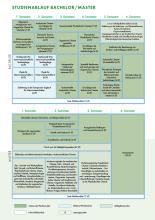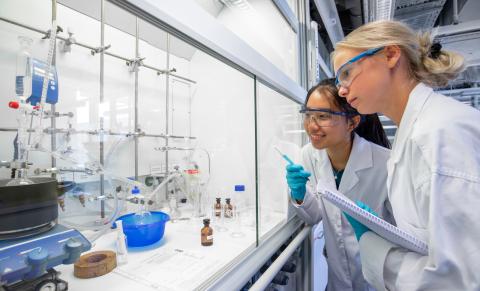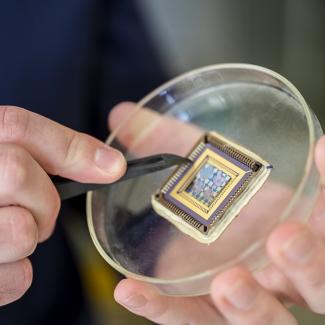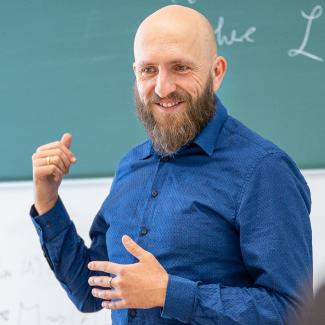Chemie
In the first four semesters, you will learn the most important fundamentals of inorganic, organic, physical, analytical, and technical chemistry as well as physics and mathematics and acquire further interdisciplinary knowledge, including English as a foreign language.
From the 5th semester onwards, you can decide for yourself which in-depth modules you would like to take, for example, "Coupling Methods in Analytical Chemistry", "Technical Catalysis" or "Microbiological-Biochemical Internship". In this way, you will be slowly introduced to the research work of the individual institutes.
In the 6th semester, you will complete your Bachelor's thesis. To do this, you deal with an interesting research topic, find out about the subject, carry out experiments in the laboratory (or on the PC), and then present your results to the other members of the institute.
Experimental lectures are an essential part of the degree program. The courses take place in comparatively small groups and practical problems are solved in teams. Online courses support individual learning. The proportion of laboratory practicals in the courses is very high at around 50 percent. There is a very good supervisor:student ratio and there are no waiting times for the basic practicals. Particularly in the first semesters, you will receive individual support from professors, scientific and technical staff as well as students.
- Faculty
-
Faculty of Chemistry, Physics and Bioscience (Faculty 2)
- Degree
-
Bachelor of Science (B. Sc.)
- Standard period of study
-
6 Semester
- Part-time possible
-
Yes
- Start of studies
-
Winter semesterSummer semester
- Admission requirement
-
Abitur or subject-specific higher education entrance qualification or an entrance qualification recognized as equivalent
Language requirement
- Application: with at least B1 level German
- Admission to the degree program: with C1 level German (e.g. DSH-2)
- language courses and DSH exam at TUBAF
- Prep Courses (Studienkolleg)
- Course language
-
German
- in the chemical industry: e.g. in research, product development and application technology, process engineering, management, chemical analysis, environmental protection, marketing, patents, public relations, and communication
- in companies: e.g. the pharmaceutical, cosmetics, food, and agricultural industries, the automotive and transport sectors, the electrical, electronics, and building materials industries as well as companies involved in energy and raw materials extraction and recycling
- at universities and research institutes: e.g. universities, Fraunhofer Institutes, and Helmholtz Centres
- in the public sector: e.g. in federal, state, and local authorities as well as trade supervisory offices and patent offices
Why study chemistry at TUBAF?
Chemistry permeates everything. Every living being is a "chemical factory". Therefore, life is not possible without chemistry. Chemistry is therefore much more than just what stinks and bangs. Chemistry will also contribute to less "stinking and banging" in the future, because only with chemistry can the great problems of mankind be solved. This requires a new generation of chemists who, for example, break new ground in sustainable chemistry, who rethink recycling, and develop efficient processes, new materials, and catalyzers so that we can continue to live a life worth living in the future. The necessary training is available in Freiberg. Be part of it!
Best results in the CHE university ranking
Many TUBAF chemistry students took part in the CHE university ranking survey. And the results are impressive: In comparison with other universities throughout Germany, our Chemistry degree programs (Bachelor and Diplom) achieved top places in all categories! You can find the detailed results here.
The detailed results of the CHE ranking were published in the ZEIT study guide and can also be viewed online (at www.heystudium.de/ranking after prior registration and internally via WISO). Here you can find the corresponding news release from TUBAF.
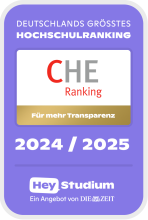
Indicator | Mean value for the TUBAF | Mean value for all universities |
| General study situation | 4,4 | 3,8 |
| Study organization | 4,8 | 4,4 |
| Support during studies | 4,4 | 3,8 |
| Laboratory practicals | 4,7 | 4,0 |
| Scientific competencies | 4,5 | 4,2 |
| Methodological skills | 4,5 | 4,1 |
| Interdisciplinary skills | 4,1 | 3,7 |
Information on further study programs at TUBAF
Master's degree programs such as "Chemistry" or "Applied Natural Science" can continue with the Bachelor's degree program.
Interests and skills you should bring with you
If you are creative, interested in science, like to try out new things, and want to know "what holds the world together at its core", then you've come to the right place!
Additional bonus: After a day in the lab, you don't have to go to the gym either ;)
Current insights into studying can be found on the Instagram channel of the Faculty of Chemistry and Physics: @tubaf_nat
